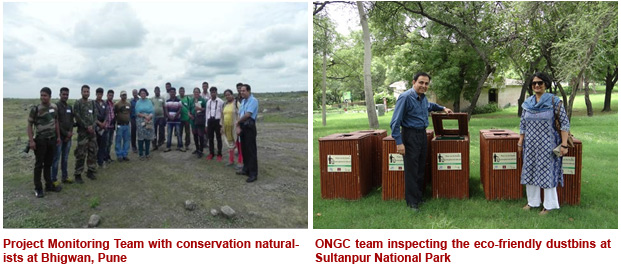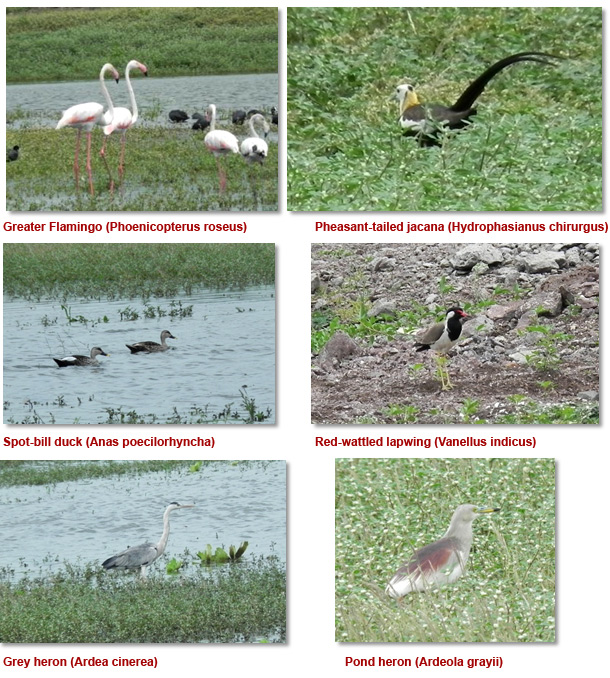डब्ल्यूटीआई के माध्यम से प्रमुख राष्ट्रीय संरक्षण पार्कों से प्रकृति मार्गदर्शिकाओं
ONGC in collaboration with the Wildlife Trust of India (WTI) has initiated a CSR project for providing training to conservation guides and naturalists from Sultanpur National Park, Corbett Tiger Reserve, Rajaji National Park and Titali Trust. This initiative has been undertaken under the guidance of Director ( HR ) by the office of GM- Head Coordination, Delhi. A total of ten conservation guides are presently undergoing training as a part of Skill development initiative under this CSR project . This project includes training of ten conservation guides in two phases, through Bharati Vidyapeeth Institute of Environmental Education and Research (BVIEER), Pune and Asian Adventures, Panghot, Uttarakhand, along with installation of eco-friendly dustbins at Sultanpur Birds Sanctuary and National Park in Haryana.
The first phase of training through BVIEER, Pune was held from 25th to 30th July, 2016. During this training the participants other than classroom training were taken out to a number of field visits to nearby conservation parks in vicinity of Pune. During one such field visit the trainees were taken to Bhigwan, a wetland near Khumbhar Gaon (120kms far from Pune). Smt Manjari Nigam , DGM (HR) from Coordination group, Delhi and Shri Monu Bhatnagar, Chief Chemist from Corp, CSR Delhi visited Pune, to monitor the project and interacted with the trainees on 28th July 2016 at Khumbhar Gaon during this field visit.
Bhigwan is the backwaters of Bhima River, stretches to about 50 kms, and provide livelihood for thousands of fisherman. Backwaters of Bhima River attracts, every year, a large number of migratory birds (from North India and other countries); about 100–150 species of flamingos and cormorants are reported. During the visit, numbers of birds like Grey Heron, Pond Heron, Spot Billed Duck, Black winged tilt, Pheasant-tailed jacana, Flamingo (Agni Pankh), Coot, Lark, Moorhen were seen by the participants.
The Forest Department appoints guides and naturalists to accompany the tourists visiting these national conservation parks. Majority of these guides and naturalists are members of the communities located around these protected areas and earn their livelihoods by tending tourists and accompanying them during their park visits. This training of these guides will provide a substantial increase in the overall average knowledge level of participants in the areas of ecology, wildlife conservation and sustainable tourism. It would help them to develop their skills and entrepreneurship of Nature tourism resulting in enhancement of their income. These guides would be passing the knowledge gained by them to the other members of their community working in the same area with them. Thus this project will have a major impact on the communities working in this profession near the National conservation parks, even though the financial implication to ONGC for the project is less than ten lakh.
During the interaction with ONGC CSR team the participants shared their learning and experiences. They learnt about ecology of birds and cleared their myths regarding snakes. One of the guides, said that this training was helping him to learn about the skills which can be used to provide information about nature and wildlife to tourists in a short duration of time. Apart from providing information to tourists, training will be beneficial to guides in terms of monetary benefits, since tourists prefer trained guides. Conservation guides suggested designating paths for trekking and birding for tourists in the protected areas.
Through this training ONGC is producing ambassadors of nature who while interacting with the tourists will also be passing the message of importance of the forests and wildlife about its conservation thus meeting the CSR objective of environment sustainability and protection of flora and fauna.
Team Corporate CSR



